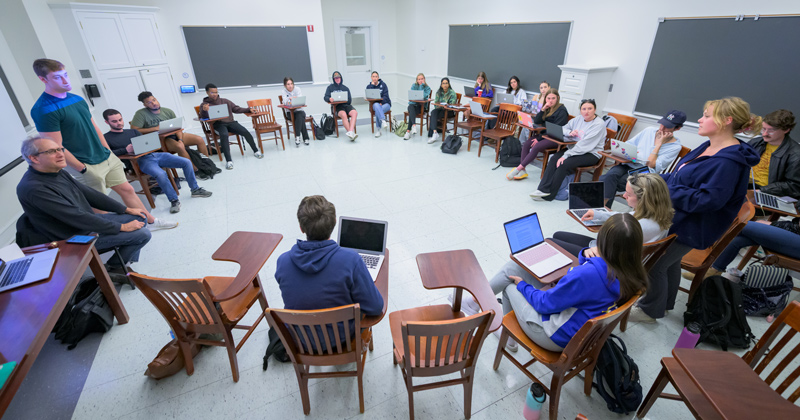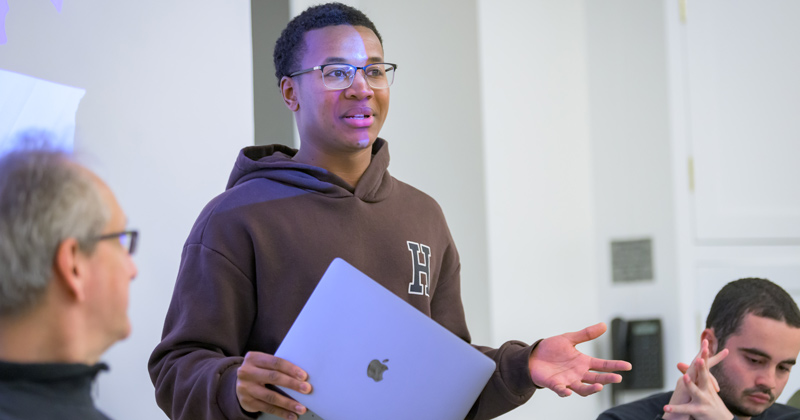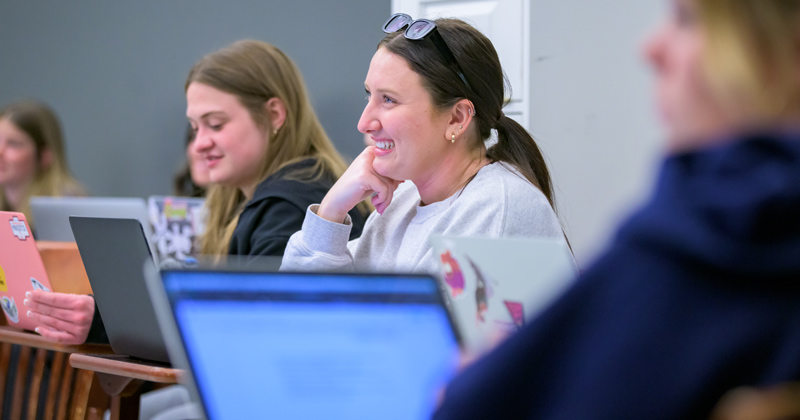

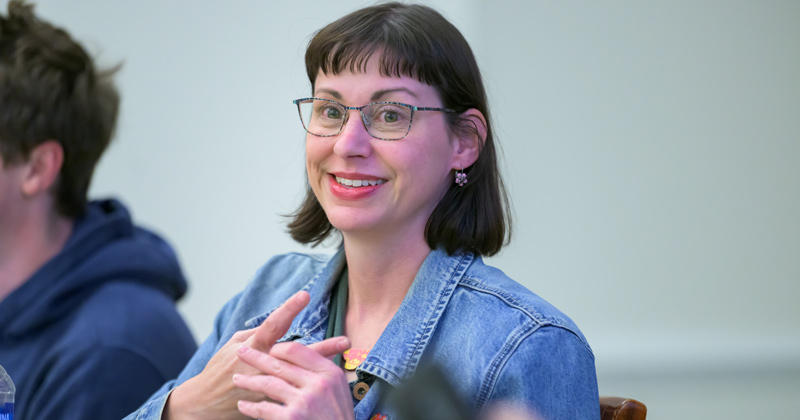
Points, counterpoints and data points
Photos by Evan Krape July 03, 2023
UD’s Lindsay Hoffman leads national study assessing impact of ‘debates and discourse’ program
Kally Bennett loves to listen to people speak their minds. She loves to think about the arguments they make as they explain their opinions.
Well, most of the time.
She got a face full of opinions when she worked as a hostess at a restaurant during the pandemic. Some patrons were not happy about the state’s requirement to wear a mask indoors, and they let her know in no uncertain terms.
“People gave us a lot of trouble every day, fighting us,” she said. “I got yelled at more times than I can count. People felt they had a right to yell at me.”
The hostility of those customers didn’t change the state’s mask requirement. It didn’t change what Kally could allow. It just made everything nastier.
Resolved: Nasty words have a certain kind of power.
But do respectful words have power?
Bennett, a rising senior and political science major at the University of Delaware, is part of a new national research project designed to help answer that question. For the next year, she will assist UD’s Lindsay Hoffman, associate professor of communication, in a project examining the impact that structured, respectful debates can have on students at 10 campuses around the country, including UD.
Hoffman is the principal investigator of the research, recruited to the task by leaders of the national “College Debates and Discourse Program.” The 5-year-old program was created by three non-profits — Braver Angels, BridgeUSA and the American Council of Trustees and Alumni (ACTA) — with the goal of helping students develop the confidence and leadership skills needed to navigate meaningful discussions, especially when the topics are controversial and complex.
The program leaders wanted to know what effect the experience was having on students. With Hoffman providing the social science expertise, the John Templeton Foundation awarded $1.26 million for the study.
But how do you measure that kind of thing? It’s not a matter of seeing how high a liquid rises in a glass beaker, looking for bacteria in a microscope or testing the battery life of electronic devices.
No, this analysis aims to measure changes in thinking, changes in perception, the largely intangible substance of intellectual activity.
Hoffman brings a researcher’s expertise and approach to such questions, along with years of experience as a communication and political science professor, associate director of the Center for Political Communication and director of UD’s National Agenda Speaker Series.
She understands the tensions that arise when strong feelings are expressed and layers of dynamics are in play. Helping students express their views, provide their reasons and take questions and comments from others is a critical role that faculty must fill, she said.
“That’s your job as a professor,” she said. “It’s what you’re supposed to be doing. So when they leave, they become leaders and help others do the same.”
That effort now shapes her research.
“I had a different research agenda going into the pandemic than I do coming out of it,” she said. “I began to see how important it was for students to learn to communicate with each other — first, in a completely virtual environment. Students lost a year or two of in-person communication and all these new challenges were facing the country — the pandemic, political issues, climate change. It was imperative to provide my students with the skills to communicate better.”
The Braver Angels program, directed by April Lawson Kornfield of Braver Angels and Doug Sprei of ACTA, aims to do that on a national scale. The goal is to give students the tools they need to express their views thoughtfully, remain calm in the face of disagreement, build relationships with those who hold opposing views and develop leadership skills.
More than 50 schools have participated in the past five years.
The new study includes 10 schools of varying sizes, populations and political leanings. In addition to UD, the other schools include Arizona State University, the University of Baltimore, Biola University in La Mirada, California, Denison University, the University of Denver, Duke University, Linn-Benton Community College in Oregon, Texas A&M - Corpus Christi, and Virginia Military Institute. Each school has a faculty fellow and two student fellows.
Hoffman will collect data and analyze student responses, looking at the views they say they held before participating in a Braver Angels debate and whether the experience changed their minds about anything.
Rules of the road
A few rules distinguish the Braver Angels College Debates and Discourse Program from competitive debates or the kind of sparring matches that sometimes pop up at family gatherings, on street corners or on social media.
Each parliamentary-style debate has a predetermined theme, announced in advance and based on students’ input. Speakers express their views on the theme for three or four minutes, then take questions from those in attendance. The order of speakers alternates from those in agreement with the resolution to those opposing it.
This back and forth continues until all interested speakers have had the opportunity to present their case and take questions.
The rules of the road are straightforward, not open for debate and enforced by the “chair,” a trained facilitator who works as the event’s emcee or referee.
Each speaker expresses a view they agree with. They are not assigned a position as they might be in a competitive debate setting.
There is no anonymity. Each speaker is announced by name and stands before the audience.
Knocking on a desk or snapping fingers are acceptable ways to express approval for a well-defended point, original thinking or compelling idea, or even to thank the speakers. When debates are done online, “jazz hands” are used in lieu of knocking on desks or other audible expressions.
There is no tolerance for yelling, ridicule, dehumanizing language or venomous attacks.
Questions about the presentation are directed to the chair, not the speaker.
That last point — the one degree of separation provided by the chair — is a strategic element of keeping the exchange of ideas going in collegial, respectful ways.
“There’s something about directing a question to the chair that removes a lot of the steam and anger,” Hoffman said.
Doug Sprei of ACTA agrees. As co-director of the program, he has seen that dynamic over and over.
“I’ve never had a debate where people exploded at each other,” said Sprei, who served as the chair of an April classroom-based debate at UD. “I’ve seen a few clenched fists before.”
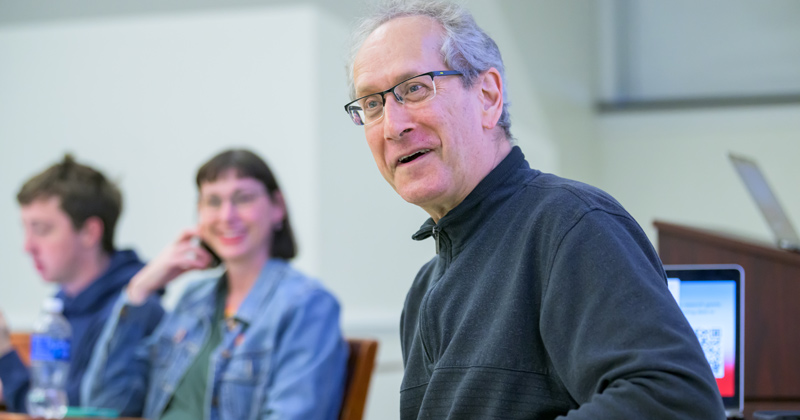
But no flying fists.
It takes no small courage to take a public stand on a controversial issue. This has always been true — let the history of the “era of debate” in the U.S. Senate bear witness — but each generation has its own twist on things.
Many of these students, digital natives all of them, know all too well what can happen when bullies, haters and angry mobs — virtual or not — attack a person instead of an idea. Scorn and derision can be powerful suppressors of free speech, especially if the one standing has not learned helpful ways to withstand such attacks.
Efforts to develop, expand and refine such training are increasing in many arenas within academia and beyond.
The Braver Angels program is meant to help all students give voice to their views, think carefully through their reasons for those views, learn how to engage with others — even those who disagree strongly — and have the confidence to change their minds if they encounter better arguments or important information that was previously unknown to them.
“Some students tend to self-censor their political viewpoints,” Sprei said. “They think there will be a backlash. Lately, I think conservative students especially feel that way. Here, we encourage students to speak their truth.”
That can make for uncomfortable stretches, and sometimes that discomfort reveals previously unrecognized realities.
Sprei recalled a debate he attended about transgender athletes.
“We had students say that transgender was the worst thing ever and not real,” he said. “Then another student stands up and says, ‘I am transgender’ — looking the previous speaker right in the eye, lovingly.”
The debates do not avoid such white-hot topics. The resolutions express the challenging questions of our day: Abortion, government-sponsored healthcare, whether college loans should be forgiven.
To see what a Braver Angels experience was like, UD hosted a debate in the fall of 2022 with the theme: “Should Greek life be eliminated?”
Students chose the topic and more than 60 students attended, Hoffman said.
“It was cool to see how excited the students were about it,” Hoffman said. “It produced more light than heat, and people were able to hear things they might not have otherwise.”
The conversations are vigorous, civil and respectful, Sprei said.
“This is an exercise in civil discourse,” he told the UD class in April. “And our country needs it…. I’m inviting you to a collective search for truth and a way to express your own viewpoints in an atmosphere where all viewpoints are respected. No student’s opinion cancels out another.”
Debate experience
UD hosted two debates in April — one in a classroom, limited to Hoffman’s students, and one open to the entire campus community.
The theme was provocative: “Resolved: Social Media Is a Threat to Democracy.”
Students brought plenty of experience with social media and plenty of insight on both sides of that debate.
Those who agreed social media is a threat to democracy listed many perils, including:
Rapid dissemination of conspiracy theories and misinformation
Easy deception of gullible followers
Rapid mobilization for purposes of violence or insurrection, as witnessed in the Jan. 6 attack on the Capitol
Profit motives that use algorithms to manipulate people and steer them to things they want to see, whether it is true or false, with increasingly hostile and deceptive content
Power to produce intense, violent backlash
Those who disagreed listed the benefits of social media, including:
Giving voice to many who would otherwise not be heard
Allowing like-minded people to connect and mobilize, as happened in the Arab Spring
Allowing marginalized groups to raise issues not addressed by mainstream media or government
Allowing people to communicate faster than ever
Making it easy to connect and stay up to date with regions, issues, people of interest to you
As the discussion continued and questions were raised, several speakers found themselves agreeing with points they hadn’t considered before and suggesting that social media presented complexities that could sometimes strengthen democracy and sometimes threaten it.
Such nuance is often lost in shouting matches or anonymous social media-based debates. The hope is that students who have participated in these structured debates will take what they have learned and apply it in other settings.
Bennett said she experienced that after participating in a debate that was part of a National Agenda class. The topic, chosen by students, was whether “cancel culture” represents a kind of accountability. She went in with a strong opinion that “cancel culture” was more an infringement of free speech than a form of accountability. But, she said, she found merit in arguments that it was a way to call out unkind treatment of others.
“It was interesting to talk to friends afterwards,” she said. “We were able to deconstruct the conversation and find some common ground. The debate started the conversation and we were able to further explain our points of view in a smaller group.
“I think that is the really beautiful part — the conversations that these debates foster outside of the space,” Bennett said.
Bennett said the Braver Angels debates have helped her value the insights of those who are not full-time students or credentialed experts, too.
“When I’m on campus, I’m thrown into important conversations,” she said. “I’m always discussing the news and the topic of the day. I’m always talking to people with different opinions.
“When I’m at home, there’s a different atmosphere. Being part of this program has made me want to listen to them more than I did before. I used to say, ‘You’re not in college like I am.’ Now I say, ‘You’re coming from a different set of life experiences and values. I need to appreciate that and understand that.’ I didn’t do that previously.”
After each Braver Angels debate, students had the opportunity to talk about the experience if they wish to. All who spoke after the UD debates this spring said they were helpful and a good way for people to speak their minds, change their minds and talk about hard questions with respectful, reasoned exchanges.
Do respectful words have power? Is the program working? Hoffman’s analysis will help to shape that debate.
About the researcher
Lindsay Hoffman is an associate professor of communication at the University of Delaware, with a joint appointment in the Department of Political Science and International Relations. She is associate director of the Center for Political Communication and director of UD’s annual National Agenda Speaker and Film Series. She earned her doctorate in communication at Ohio State University and joined the UD faculty in 2007. Her primary research areas include political communication, public opinion, political campaigns, media effects, and technology and politics.
Contact Us
Have a UDaily story idea?
Contact us at ocm@udel.edu
Members of the press
Contact us at 302-831-NEWS or visit the Media Relations website

